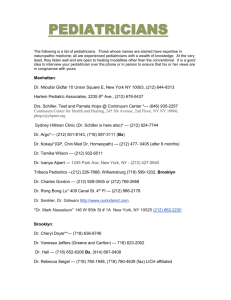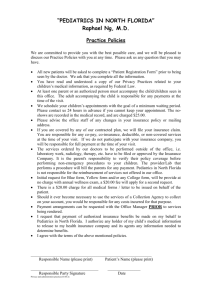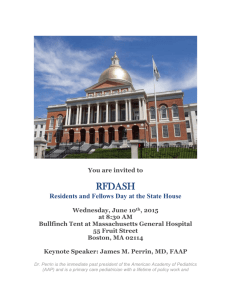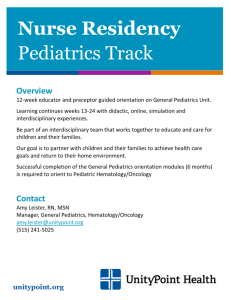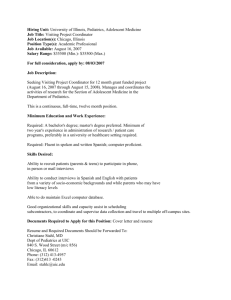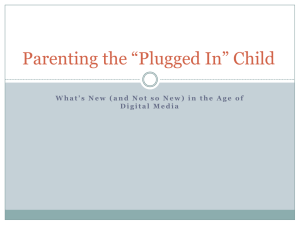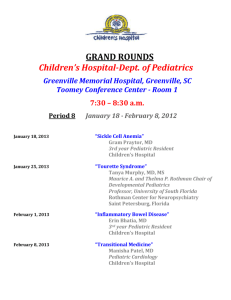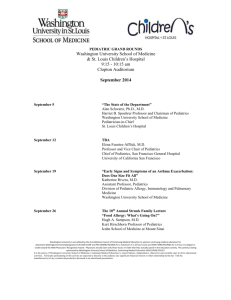PDF - Hospital Pediatrics
advertisement
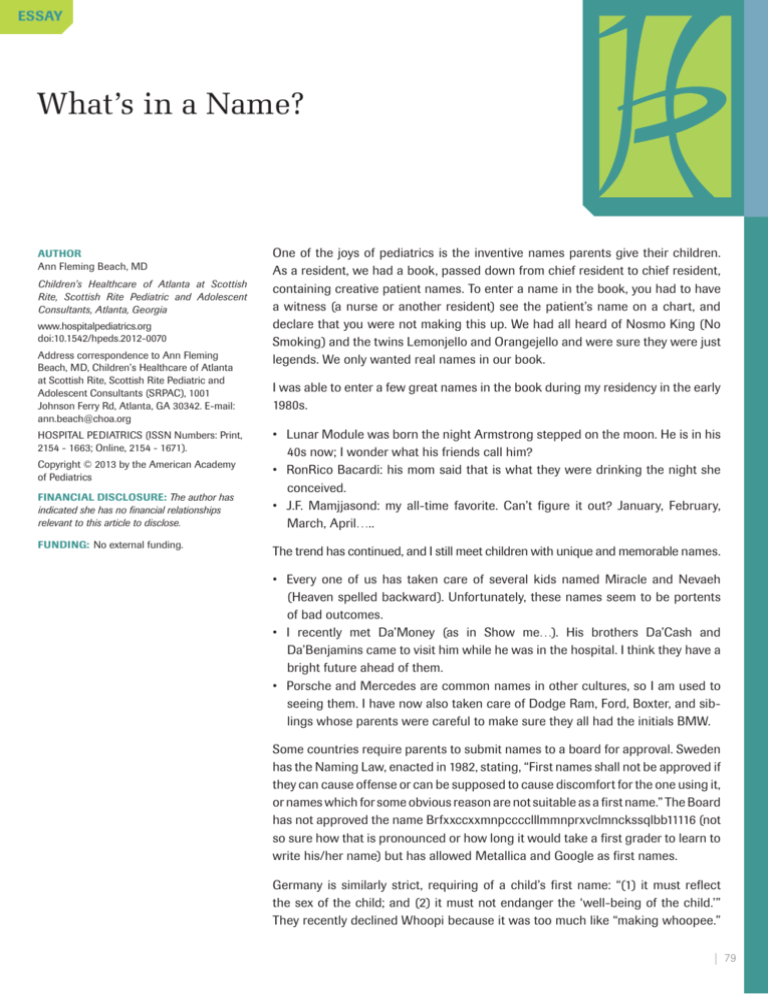
ESSAY What’s in a Name? AUTHOR Ann Fleming Beach, MD Children’s Healthcare of Atlanta at Scottish Rite, Scottish Rite Pediatric and Adolescent Consultants, Atlanta, Georgia www.hospitalpediatrics.org doi:10.1542/hpeds.2012-0070 Address correspondence to Ann Fleming Beach, MD, Children’s Healthcare of Atlanta at Scottish Rite, Scottish Rite Pediatric and Adolescent Consultants (SRPAC), 1001 Johnson Ferry Rd, Atlanta, GA 30342. E-mail: ann.beach@choa.org HOSPITAL PEDIATRICS (ISSN Numbers: Print, 2154 - 1663; Online, 2154 - 1671). Copyright © 2013 by the American Academy of Pediatrics FINANCIAL DISCLOSURE: The author has indicated she has no financial relationships relevant to this article to disclose. FUNDING: No external funding. EIA is a recurring section of Hospital Pediatrics where expert pediatric hospitalists give their interpretation of the recent evidence in reference to common clinical questions encountered in their daily practice. One of the joys of pediatrics is the inventive names parents give their children. As a resident, we had a book, passed down from chief resident to chief resident, containing creative patient names. To enter a name in the book, you had to have a witness (a nurse or another resident) see the patient’s name on a chart, and declare that you were not making this up. We had all heard of Nosmo King (No Smoking) and the twins Lemonjello and Orangejello and were sure they were just legends. We only wanted real names in our book. I was able to enter a few great names in the book during my residency in the early 1980s. • Lunar Module was born the night Armstrong stepped on the moon. He is in his 40s now; I wonder what his friends call him? • RonRico Bacardi: his mom said that is what they were drinking the night she conceived. • J.F. Mamjjasond: my all-time favorite. Can’t figure it out? January, February, March, April….. The trend has continued, and I still meet children with unique and memorable names. • Every one of us has taken care of several kids named Miracle and Nevaeh (Heaven spelled backward). Unfortunately, these names seem to be portents of bad outcomes. • I recently met Da’Money (as in Show me…). His brothers Da’Cash and Da’Benjamins came to visit him while he was in the hospital. I think they have a bright future ahead of them. • Porsche and Mercedes are common names in other cultures, so I am used to seeing them. I have now also taken care of Dodge Ram, Ford, Boxter, and siblings whose parents were careful to make sure they all had the initials BMW. Some countries require parents to submit names to a board for approval. Sweden has the Naming Law, enacted in 1982, stating, “First names shall not be approved if they can cause offense or can be supposed to cause discomfort for the one using it, or names which for some obvious reason are not suitable as a first name.” The Board has not approved the name Brfxxccxxmnpcccclllmmnprxvclmnckssqlbb11116 (not so sure how that is pronounced or how long it would take a first grader to learn to write his/her name) but has allowed Metallica and Google as first names. Germany is similarly strict, requiring of a child’s first name: “(1) it must reflect the sex of the child; and (2) it must not endanger the ‘well-being of the child.’” They recently declined Whoopi because it was too much like “making whoopee.” | 79 HOSPITAL Pediatrics ® AN OFFICIAL JOURNAL OF THE AMERICAN ACADEMY OF PEDIATRICS Remember “Pat” on Saturday Night Live? We were never quite sure of Pat’s gender. That won’t do in Germany. Of all the Scandinavian countries, Denmark seems to be the strictest regarding naming. There is a preapproved government list of 7000 names to choose from; any other name requires special dispensation. The government feels an obligation to protect its weakest citizens (children) from things out of their control. The People’s Republic of China has a different issue. There are 32 252 characters in the Chinese government’s computer systems, and the government wants a child’s name to be able to be typed and officially entered into databases; the law, therefore, is based on technical capability, not name appropriateness. A child’s name has to have only Chinese characters. Latin characters, numbers, or other non-Chinese symbols are not allowed because they cannot be entered into computers. What would the Artist Formerly Known as Prince do there? Zhao C had to change his name, as C is not an allowed name. Recently, parents attempted to name their baby Wang @. In Chinese, @, when pronounced, sounds similar to the word meaning “love him.” The government was not impressed. The Japanese government has a similar problem with a character-based writing system and has ruled that only 996 kanji characters are allowed for basic education and 949 kanji characters for general use, plus 92 characters especially for use in names. Apparently, Japanese parents are just like American parents because this approved list of naming characters continues to grow and now includes a whopping 983. And Japanese parents are demanding more characters. 80 | VOLUME 3 • ISSUE 1 This summer, New Zealand’s government released a list of names that had been rejected by their name-approval registrars. It’s a fun read. The interesting list includes Stallion, Yeah Detroit, Fish and Chips, Sex Fruit, Satan, Adolf Hitler, Justice, King, Prince, Baron, Duke, Anal, Christ, *, and 89, among many others. However, they did approve Benson and Hedges (for twins). The United States and Great Britain seem to be the most lenient. If you can spell it, you can name your child. Eccentricity seems to be the norm now. We all know Moon Unit and Dweezil (Frank Zappa), Apple (Gwyneth Paltrow), and Pilot Inspektor (Jason Lee); Kal-El, after Superman (Nicholas Cage); Sage Moonblood (Sylvester Stallone); Jermajesty (Jermaine Jackson); and Zuma Nest Rock (Gwen Stefani). Condoleezza Rice’s name was chosen because it sounded like con dolcezza (a musical term meaning to play “with sweetness”). We all remember Picabo Street, the gold medal Olympic skier, who was named after a nearby town. In my own family, my cousin Peter Max (a 1960s pop artist known for his psychedelic cosmic Beatles album covers) named his children (born in the 1960s flower power era) Libra Astra and Adam Cosmos. Appropriate for that time. As a sign of the current times, there was a recent news article about a newborn named Like, after the Facebook “like” button. So, with all of this focus on creative, original names, does it make a difference? Names may have powers we are only beginning to understand. Figlio’s 2006 study in Education Finance and Policy showed that girls with very feminine names (Isabella, for example) are less likely to study math as they get older. In a more worrisome vein, www.hospitalpediatrics.org Figlio looked at so-called “linguistically low-status” names. Even when correcting for races and ethnicities, there are certain letter combinations (Alekzandra instead of Alexandra or the prefix “Sha” rather than “La”) that are more often used by high school– dropout moms. These children with the “low-status” names were referred for special education more often and performed more poorly on tests. Teachers admitted to Figlio that they had to work hard not to stereotype children, based on their names. Boys with genderneutral names (such as Pat, Ashley, or Shannon) often have more behavioral problems in middle school than their friends named Brian or Michael. Another study, published in the Journal of Experimental Social Psychology, showed that people with easy-to-pronounce names were more often promoted, especially if they were lawyers. What about changing names? Snoop Dog is now Snoop Lion. A recent study showed that 1 in 5 parents regretted the name they had given their child, especially if they had chosen an unusual spelling. In fact, the most common reason for changing a name is an objectionable spelling or pronunciation. (Just how many times can you correct someone about your name before you can’t stand it anymore?) Google CEO Eric Schmidt has publicly recommended that teenagers be allowed to legally change their names upon becoming adults so that their adolescent indiscretions out there on the Web will no longer be linked to them. Far-fetched? Perhaps not. Some people feel so strongly about a cause that they are willing to change their name. Christopher Garnett became Kentucky FriedCruelty.com, Brandi Valladolid became RinglingBeatsAnimals.com, and Marvin Richardson legally changed his full name to Pro-Life. HOSPITAL Pediatrics ® Now that I know all of this about names, I would be terrified to have to name a child. What a responsibility! My 19-year-old son (named after his father and grandfather) seems to be unscarred so far, but I wouldn’t want to press my luck. AN OFFICIAL JOURNAL OF THE AMERICAN ACADEMY OF PEDIATRICS http://www.nytimes.com/2009/04/21/world/ asia/21china.html?_r=1 http://www.danwei.org/language/zhao_left_ crescent_needs_a_new.php http://en.wikipedia.org/wiki/Naming_law_in_ Sweden http://thefloridamasochist.blogspot.com/2006/ 06/pick-your-babys-name-not-so-fast-in.html http://www.economist.com/node/21542749 http://andrewgelman.com/2007/05/names_ really_do/ h t t p: // h e al t h l a n d . t im e . c o m / 2 011/12 /0 2 / how-baby-names-affect-your-childs-future/ http://www.slate.com/articles/business/the_ dismal_science/2005/04/a_roshanda_by_ any_other_name.html | 81
